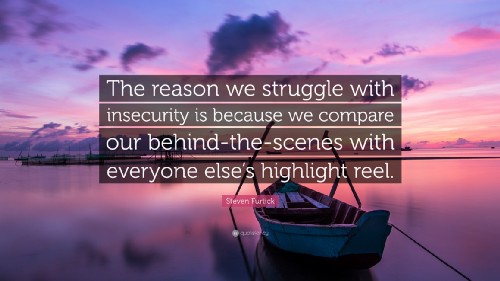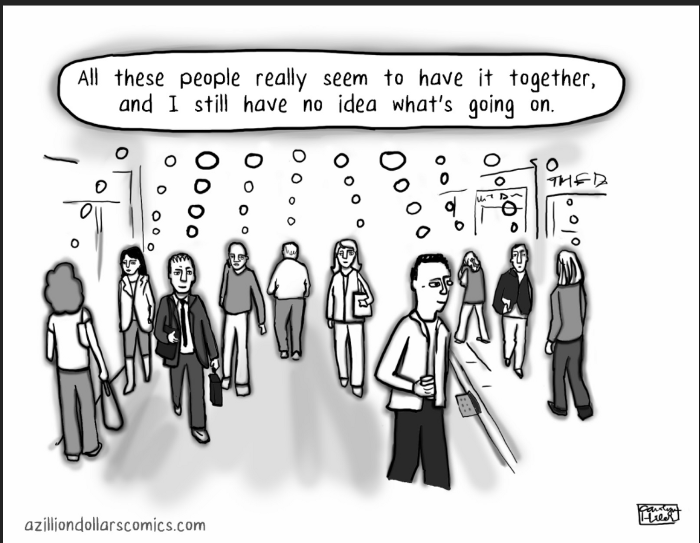I remember reading a book when I was training to become a Clinical Psychologist which recounted André Malraux asking a parish priest, who had listened to confessions for half a century, what he had learned about mankind. The priest pondered for a while and responded with this: “First of all people are much more unhappy than one thinks…and the fundamental fact is that there is no such thing as a grown up person.”
As a psychotherapist and clinical psychologist, and having almost two decades of listening to people, I must say I agree with this Priest. Today, I will focus on the first part of his observation and in the next blog the second part (there is no such thing as a grown up person).
Happiness is not a state of being, it is a moment. We have moments of happiness throughout our life, but our resting state of being is not happiness. A successful life is probably a contented one, but to be content, I put to you — we need to be okay with not being okay.
We are all not okay. The idea we can be okay is far-fetched and ridiculous. We struggle, we suffer, we doubt, we fear and we are anxious, and this is often a day to day, if not minute to minute, occurrence. This is the price of admission to living and consequently also a very human experience. But for some reason we keep our shared vulnerability at bay and hide it from one another. Some of us are better at hiding then others but in my position as a therapist I see no difference between the struggles of my clients and the day to day suffering I see in family, friends, colleagues and within myself. The only difference is the order of magnitude and the ability to be vulnerable with another. When we hide the truth of our lived experience, we end up stigmatising “not okay,” and we make disordered “not okay.” We medicalise people’s suffering, all under the pretence that to struggle is abnormal.
And yet almost 50% of people will have a “mental health crisis” in their lifetime and globally right now one in five middle aged adults are prescribed antidepressants. With these stats in mind, it begs the question:
I wonder if we are already there, and have been here for a long time, but we have become so good at hiding, none of us quite realise it. Consequently, we end up striving for what is abnormal rather than what is the normal human experience.

No one is together. No one has it all sorted. No one is perfect and no one escapes suffering. The client’s that I see are not unwell or ill and are definitely not unusual. They are just human beings trying to get through this world, as we all are. There is no difference between them and me. We are fellow travellers through this world, each on our own path, but each path brings pain and suffering along the way. Some have a more hazardous journey than others, and if I was on their path I would be tripped up as much as they were and fall as often as they did.

The idea that we are different and those who are “mentally ill” are anything other than human beings who have suffered does no-one any favours. When we stigmatise those who suffer with anxiety, depression or other mental health conditions, we become complicit in silencing the truth. The truth that we are all suffering in some way. We all are struggling for contentment, we are all wanting connection, we are all anxious over aspects of life and unhappy over others. We are all trying to put a cover up and pretend we are okay, whilst silently thinking “everyone else has it together; why don’t I?” How is this helpful? When we take this stance, we stand alone in this at times, terrifying world, scared to admit our vulnerabilities. We end up idealising each other’s worlds not realising, how close to the brink that person you think you should be, is to crisis.
“Can you feel sad and still feel good about yourself?”
The key for all of us whilst we are here on this planet is to embrace our humanity, because to be human means to struggle at times and either we can stigmatise that as “illness” or diagnose it or we can all be vulnerable together, as a fellow human on our own journey. The truth is struggle, suffering, contentment and joy can all co-occur. This co-occurrence is possible but the way we define success or failure in our culture has rendered this almost impossible. As an example, I often ask my clients, “can you be sad and still feel good about yourself?” Many people laugh at this question, as they realise inside that somehow they have never been allowed this simple possibility, but when I say it, they realise how silly it is that sadness and feeling good about oneself cannot sit side by side. Where did this idea come from — that to be sad means one cannot feel good about ourselves? It is so ingrained into our culture and family systems that we have developed a world where we have to put on the mask of good or positive and hide what is deemed as bad or negative. This is a violence we have done to ourselves and each other. A violence that needs an Are you Okay? day, but the truth is we are complex creatures with the capacity for more than one feeling at a time and we suffer and struggle, and feel lost at various points throughout our lives, and thus we are all NOT okay, and you know what — that is okay — if we allow it to be.


